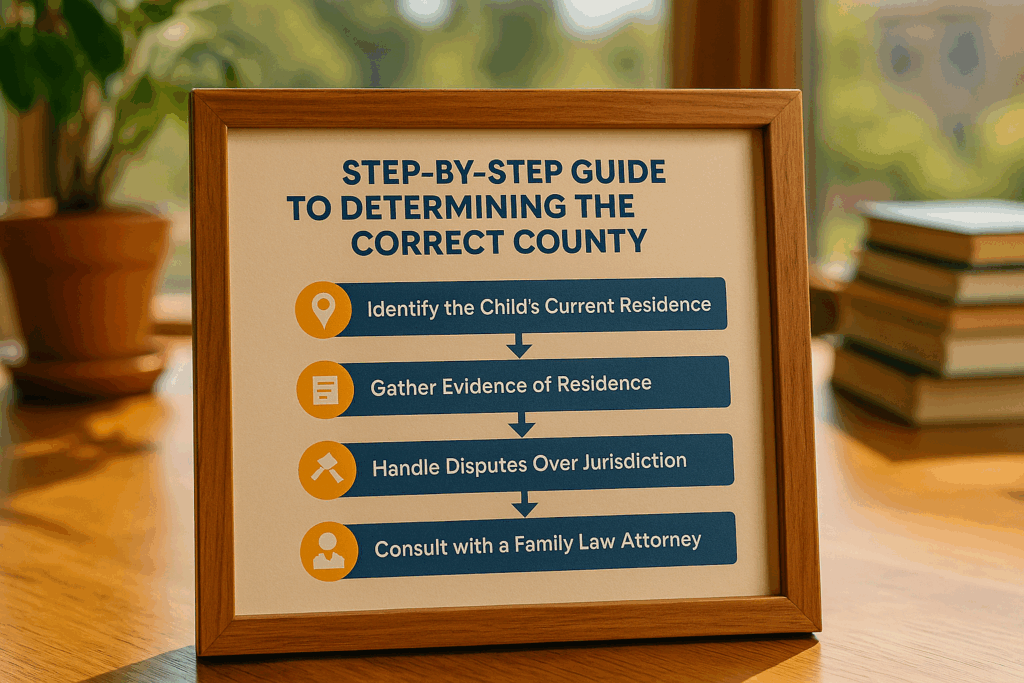
Ever try baking a cake and realize halfway through that you used salt instead of sugar? Now imagine that—but with your custody case. That’s kind of what it feels like when parents accidentally file in the wrong Texas county. It may seem like a small mix-up, but it can delay your case, cost more money, and, most importantly, create unnecessary stress for your kids. That’s why filing for custody in the correct Texas county is one of the most critical—and overlooked—steps in the entire custody process.
In this blog, we’re pulling back the curtain on how county jurisdiction really works in Texas custody cases. We’ll explain what it means to file in the “right” place, why it matters to your case and your child’s well-being, and what happens if you get it wrong. Spoiler alert: the court won’t just roll with it—and neither should you.
But this isn’t just about legal red tape. We’re also going to talk about something that gets lost in the paperwork shuffle: your child’s academic success. Divorce can flip a child’s world upside down—new homes, new routines, sometimes even new schools. Those changes can take a serious toll on their education, focus, and confidence. So we’ll walk you through real strategies to protect your child’s school life while navigating custody, from creating stable parenting plans to working with teachers and counselors.
Whether you’re just beginning the process or correcting a misstep, keep reading. You’ll find legal clarity, practical tools, and compassionate advice from a team that’s been there—helping Texas families every step of the way. At The Law Office of Bryan Fagan, PLLC, our mission is simple: we educate families, protect futures, and help you move forward with confidence. Let’s dive in.
Key Takeaways
- Understanding jurisdiction and venue in Texas custody cases is vital to ensure that the correct court hears the case, safeguarding both the child’s best interests and the enforceability of custody arrangements.
- Filing a custody case in the wrong county can result in significant delays and increased legal costs, emphasizing the importance of selecting the correct venue based on the child’s residency as outlined in Texas Family Code Section 103.001.
- Consulting a family law attorney before filing for custody can help navigate jurisdictional complexities, avoid costly mistakes, and enhance the likelihood of achieving favorable outcomes in custody proceedings.

Secure Your Child’s Future—Start Today
Don’t face custody challenges alone. Schedule your consultation now with a trusted Texas family law attorney and gain the clarity, support, and legal protection your family deserves.
Understanding Jurisdiction and Venue in Texas Custody Cases
When it comes to filing for custody in the correct Texas county, understanding the difference between jurisdiction and venue is absolutely essential. Jurisdiction refers to the court’s legal authority to decide your case, while venue is about choosing the right county within Texas where that case should be filed. Both must align correctly—because filing in the wrong place can delay your case, increase your costs, and jeopardize your child’s stability.
Under Texas Family Code §152.201, a Texas court can only exercise jurisdiction over a custody matter if Texas is the child’s “home state”—typically where the child has lived for at least six months. If your child hasn’t been in one place long, the court will consider other factors, like where the child has significant ties. Once jurisdiction is established, Texas Family Code §103.001 directs you to file in the county where the child has most recently resided for that six-month period. Failing to follow these rules can lead to dismissal or a motion to transfer venue—both of which add stress and delay.
This is especially important in a Suit Affecting the Parent-Child Relationship (SAPCR), where the initial filing sets the legal groundwork for the entire case. Filing in the correct county ensures the court has not only the authority but also the practical ability to assess your child’s living situation, educational needs, and emotional well-being. It’s also a strong step toward demonstrating to the court that you’re acting in your child’s best interests.
To see how custody cases progress once filed, check out Texas Child Custody Case Timeline: What to Expect. And if you want to dive deeper into how judges evaluate these matters, our blog on what to expect in a Texas child custody case can help you prepare emotionally and legally for what’s ahead.
At The Law Office of Bryan Fagan, PLLC, we take pride in guiding families through every step of the custody process—from choosing the right county to building a parenting plan that protects your child’s future. Our attorneys are here to ensure your case begins with precision, compassion, and a focus on what matters most: your child’s well-being.

Why Filing in the Correct County Matters
Filing for custody in the wrong jurisdiction can lead to significant delays and increased legal costs. Imagine Imagine preparing for months—only to find out your custody case was filed in the wrong county and now has to start all over again. The frustration is real, and so is the cost. Between court fees, wasted time, and emotional strain, a simple mistake in venue can have major consequences. That’s why filing for custody in the correct Texas county isn’t just a detail—it’s a strategic decision that protects both your rights and your child’s future.
Under Texas Family Code §103.001, custody cases must be filed in the county where the child has lived for the previous six months—or from birth if they’re younger than that. Filing elsewhere can result in dismissal or a court-ordered transfer, disrupting your timeline and potentially weakening your position. Selecting the right venue helps ensure that custody orders are enforceable and reduces the risk of avoidable jurisdictional disputes.
Our attorneys often assist clients who live in areas like Montgomery County, helping them avoid filing errors and ensuring every case begins in compliance with Texas law. This attention to detail lays the groundwork for a smoother legal journey and custody plan that supports your child’s best interests. To better understand how custody cases unfold, we also recommend reading our detailed guide on what to expect in a Texas child custody case.
At The Law Office of Bryan Fagan, PLLC, we don’t just file paperwork—we help families build a future. From ensuring your case is filed in the proper venue to crafting parenting plans that keep your child’s well-being front and center, our team is here to guide you through every step. With the right legal partner and the right starting point, you can move forward with confidence—and peace of mind.

Applicable Statutes: Texas Family Code Section 103.001
Texas Family Code Section 103.001 is a critical statute that dictates where custody cases must be filed. According to this statute, a custody case must be initiated in the county where the child has lived for the past six months or, if the child is younger than six months, in the county of the child’s birthplace. This requirement ensures that the court handling the case has a strong connection to the child’s current living situation and can make informed decisions based on substantial evidence.
Section 103.001 mandates specific filing requirements to prevent jurisdictional disputes and ensure that custody cases are heard in the most appropriate district court. This statute underscores the importance of adhering to proper jurisdictional rules to exercise jurisdiction, avoid case dismissals or transfers, which could delay proceedings and increase court costs, as outlined in the enforcement act.
Knowing where to file based on the child’s home state residency is crucial for a smooth and effective legal process in your child’s case.
Common Scenarios Leading to Jurisdictional Confusion
Jurisdictional confusion often arises in custody cases due to various common scenarios, such as:
- Parents living in different counties, leading to disputes over which county has proper jurisdiction.
- Each county having different laws and procedures, complicating the determination of the correct venue for filing.
- Temporary relocations for education or medical reasons disrupting the child’s stable living situation, further complicating custody jurisdiction.
Military families face unique challenges due to frequent relocations. Even if they maintain residency elsewhere, an out of state parent may file for custody in Texas if stationed there for at least six months. Similarly, interstate moves can create confusion about which state has the authority to hear the custody case. These scenarios highlight the importance of understanding and navigating jurisdictional rules to ensure that the case is filed in the appropriate court.
Identifying these common scenarios helps a child’s parent prepare for potential jurisdictional disputes and take proactive steps to address them. Understanding the specific challenges of each scenario helps in making informed decisions that protect the child’s well being and the well being of children, as well as the child’s safety.
Step-by-Step Guide to Determining the Correct County
Successfully filing for custody in the correct Texas county begins with one key task: determining where your child legally resides. According to Texas Family Code §103.001, a custody case must be filed in the county where the child has lived for the previous six months, or, if under six months old, in the county of birth. Getting this right is more than procedural—it’s critical for the enforceability of court orders and the overall efficiency of your case.
To ensure you’re filing in the proper venue, you’ll want to start by identifying your child’s primary residence. This may involve gathering documentation such as school enrollment records, pediatrician visit logs, lease agreements, or utility bills. These records help demonstrate not only where the child lives but also their ties to the community—factors courts consider when assessing jurisdiction and venue.
Jurisdictional disputes sometimes arise, especially when parents live in different counties or if the child has recently moved. In these situations, it’s important to act quickly and consult a qualified family law attorney. The attorneys at our firm have extensive experience helping clients navigate complex jurisdictional issues, including multi-county and multi-state custody cases. We also serve families across numerous Texas counties, which you can explore on our service area page for additional guidance and resources.
For a closer look at how custody proceedings unfold once venue is properly established, we recommend reading our blog on what to expect in a Texas child custody case. Taking time to understand the steps and legal requirements can save you costly delays and ensure that your case begins with a strong, jurisdictionally sound foundation. The Law Office of Bryan Fagan, PLLC remains committed to helping Texas families make informed choices that protect both legal rights and the emotional well-being of their children.

Gathering Evidence of Child’s Residence
Collecting evidence of your child’s residence is crucial when filing for custody. Documentation such as:
- School enrollment records
- Medical records
- Other official documents can confirm where the child currently lives. This evidence verifies the child’s residence and ensures the case is filed in the correct county, as required by Texas Family Code Section 103.001.
If there is a dispute regarding jurisdiction, it becomes even more critical to gather substantial evidence of the child’s residence and connections to the state. This evidence will support your case and help resolve any jurisdictional conflicts, ensuring that the custody proceedings can move forward without unnecessary delays related to the child support order and child support payments.
Handling Disputes Over Jurisdiction
Disputes over jurisdiction require careful consideration and legal consultation. If there is a disagreement about which county court has proper jurisdiction in a family law matter, it is essential to consult a family law attorney.
An experienced attorney general can navigate jurisdictional complexities and ensure your case is filed in the correct court, avoiding costly mistakes and delays.
Consulting with a Family Law Attorney
It is highly advisable to consult a family law attorney before filing for custody because:
- Legal advice can clarify jurisdictional requirements and help you navigate the complexities of custody filings.
- An experienced attorney can assist in preparing the necessary documents.
- They can help strategize for court hearings.
- They ensure compliance with all jurisdictional rules.
This proactive approach can significantly enhance the chances of a smooth sole custody process and favorable outcomes, potentially leading to sole conservatorship.
Engaging a family law attorney provides peace of mind, knowing you have expert legal representation throughout the legal process. The attorney’s expertise can prevent common mistakes and ensure that your custody case is handled efficiently and effectively.
Practical Tips for Parents
When it comes to custody disputes, a few practical steps can make a significant difference—starting with filing for custody in the correct Texas county. According to Texas Family Code §103.001, custody cases must be filed in the county where the child has lived for the previous six months. Filing in the wrong county can lead to unnecessary delays, additional court costs, and even a dismissal or transfer of your case.
One of the most effective ways to protect your case from these setbacks is to confirm venue requirements early. Use documents like school enrollment records, pediatrician visits, or residential leases to establish your child’s primary residence. These records not only prove where your child lives but also support the legal foundation needed for the court to exercise jurisdiction properly.
Before initiating your case, consulting with a qualified family law attorney can help ensure every filing meets Texas legal standards. At our firm, we regularly assist parents in areas like Johnson County, helping them verify jurisdiction, gather the right documentation, and avoid costly mistakes that could disrupt the custody process. This kind of proactive legal support is essential for keeping your case on track and aligned with your child’s best interests.
For more detailed guidance on how Texas custody cases progress and what steps to expect, visit our resource on what to expect in a Texas child custody case. At The Law Office of Bryan Fagan, PLLC, we’re committed to providing families with the legal clarity and compassionate counsel they need to make informed decisions and protect their children’s futures.

Real-Life Examples from the Law Office of Bryan Fagan, PLLC
Real-life examples from the Law Office of Bryan Fagan, PLLC, illustrate the importance of proper venue selection. In one case, a family initially filed in the wrong county, causing significant delays. After correcting the venue, the case progressed more efficiently, leading to a favorable outcome. Proper venue selection can lead to smoother custody proceedings and better outcomes for families.
Families selecting the appropriate venue typically experience reduced stress and clearer communication during custody proceedings. The Law Office of Bryan Fagan, PLLC provides expert guidance in determining the correct county for custody filings, helping family members achieve better results.
How the Law Office of Bryan Fagan, PLLC Can Help
At The Law Office of Bryan Fagan, PLLC, we understand that no two custody cases are alike—and that personalized legal guidance can make all the difference. Our team offers compassionate support and clear legal direction, starting with your first consultation. Whether you’re facing a standard custody filing or need to act urgently, being well-prepared with the right documents and legal insight is key to protecting your rights and your child’s well-being.
One of the most important steps in any case is filing for custody in the correct Texas county. Per Texas Family Code §103.001, custody proceedings must be filed where the child has resided for the past six months—or since birth if younger than six months. Our attorneys work closely with clients to determine proper venue, helping avoid dismissals, transfer motions, or delays that could impact a child’s stability. These details matter even more in urgent matters, such as those involving emergency custody.
For parents navigating high-stakes situations, our firm also provides experienced counsel on emergency orders. If you believe your child is in immediate danger, filing in the right venue is especially critical. You can explore more about this process on our dedicated page for emergency custody cases, where we outline what to expect and how to take swift, lawful action.
To better understand how a custody case unfolds from beginning to end, we invite you to read our guide on what to expect in a Texas child custody case. From first steps to final orders, our firm is here to educate families and protect futures—every step of the way.

Conclusion:
Getting custody right starts with getting the basics right—and yes, that includes filing in the correct Texas county. It’s a detail that seems small until it suddenly isn’t. The good news? You don’t have to figure it all out on your own.
At The Law Office of Bryan Fagan, PLLC, we know how overwhelming it can feel to juggle legal logistics, parenting plans, and your child’s school schedule—all while trying to keep some kind of normalcy in your life. But with the right legal guidance and a thoughtful strategy, you can protect your child’s routine, support their academic success, and create a stable path forward—one filed in the right place, for the right reasons.
If you’re standing at the crossroads of divorce, custody, and county confusion, this is your sign to reach out. Our team offers free consultations, and we’re here to help you make smart decisions today that lead to stronger outcomes tomorrow.
Because let’s be honest—your kid probably doesn’t care what county the case is filed in. But they will care about staying in the same school, sleeping in the same bed, and knowing that you’ve got things under control.
So take a deep breath. You’ve got this—and we’ve got your back.
Frequently Asked Questions About Texas Child Custody
Where to file for custody in Texas?
Custody cases in Texas must be filed in the county where the child has lived for the past six months, or since birth if the child is younger than six months. This ensures the court has jurisdiction under Texas Family Code Section 103.001.
What not to say during a custody battle?
Avoid making negative statements about the other parent, threatening court actions, or discussing custody with your child. Judges frown upon behavior that appears hostile, manipulative, or emotionally damaging to the child.
What do judges look at when deciding custody in Texas?
Judges in Texas prioritize the best interest of the child, considering factors like the child’s emotional and physical needs, each parent’s stability, the quality of the parent-child relationship, and educational continuity.
What are the custody rules in Texas?
Texas custody law recognizes legal custody as ‘conservatorship.’ The court may assign joint managing conservatorship or sole managing conservatorship, depending on what’s best for the child. Parenting time, child support, and parental duties are addressed in the final order.
How much does it cost to file for full custody in Texas?
Filing fees vary by county but typically range from $250 to $350. If you work with an attorney, total legal costs can be significantly higher depending on the complexity of your case.
What makes a parent unfit for custody in Texas?
A parent may be deemed unfit if there is evidence of abuse, neglect, substance abuse, criminal activity, or inability to provide a stable home. Courts assess fitness based on the child’s safety and well-being.
What is the biggest mistake in a custody battle?
One of the biggest mistakes is failing to put the child’s needs first. Hostile behavior, ignoring court orders, or alienating the other parent can severely damage your credibility and case.
Who wins most child custody cases?
Texas courts do not favor one parent over another based on gender. The parent who demonstrates stability, cooperation, and a plan in the child’s best interest is more likely to receive primary custody.
Who are the best witnesses for a custody case?
Ideal witnesses include teachers, daycare providers, family friends, counselors, and others who have observed your parenting. Professional, unbiased individuals carry the most weight in court.
lawyer, domestic violence, lawsuit, rights, how to file a sapcr in texas, parent, court, contact, law, conservatorship, judge, child custody, alimony, grandparent, mediation, petition, best interests, health, jurisdiction, divorce, legal guardian, personal injury, family law, child support, criminal law, document, education, violence, adoption, alternative dispute resolution, texas family law, legal, family lawyer, restraining order, burden of proof, marriage, negotiation, father, waiver, aunt, attorney general, houston, legal advice, behavior, filing for custody in texas, evidence, joint custody, abuse, parenting plan, sole custody, witness, advocate, stress, fee, child custody lawyer, high net worth, family law attorney, sole managing conservatorship, texas county, possessory conservator, knowledge, neglect, testimony, receipt, property, estate planning, court clerk, court costs, contract, trial, alcohol, complexity, understanding, health care, emergency, legal separation, summons, custody forms texas, file for custody online texas, how to get sole custody texas, substance abuse, tax, probate, bar association, expert, prenuptial agreement, trust, power of attorney, state bar association, will and testament, asset, law attorney, free consultation, family law lawyer, law firm, family law lawyers, lawyers, sole managing conservator, shared parenting, legal aid, state bar of texas, evaluation, injury, reputation, landscape, child protective services, compass, information, estate, credit, income, conflict of interest, community, resource, thomson reuters, dispute resolution, data, drug
Related Pages:
how to file for full custody in texas, how to file for child custody in texas, filing for child custody in texas, how to file for custody in texas, sole conservatorship lawyers in the river oaks texas, how to file for visitation rights in texas, filing for custody in the correct texas county
Bryan Joseph Fagan is a respected child custody attorney based in Houston, Texas, with deep roots in Atascocita. As the first lawyer in a close-knit family that includes two adopted brothers, Bryan brings a personal connection to every family law case he handles. His early caregiving experience—supporting his grandmother through Alzheimer’s while attending night school at South Texas College of Law—shaped his unwavering commitment to helping families through life’s toughest transitions.
Now a father of three, Bryan’s real-world parenting perspective enhances his legal insight. He leads one of the most dynamic family law teams in Texas, with a particular focus on child custody, visitation rights, and protecting parental rights. From hotly contested custody battles to amicable co-parenting arrangements, Bryan and his team understand that at the heart of every case is a child who deserves stability, safety, and love.
As a certified member of the College of the State Bar of Texas, Bryan holds himself to the highest standards of legal excellence and continuing education. He is known for crafting innovative, effective legal strategies that reflect both the letter of the law and the emotional realities families face.
Bryan’s practice spans every aspect of Texas family law, including:
Custody and visitation disputes
Modifications and enforcement of existing orders
Complex divorce proceedings involving children
Adoption and paternity cases
Marital property agreements
Defense against false CPS allegations
Bryan is also an active member of the Houston Bar Association’s Family Law Section and participates in statewide legal groups committed to improving outcomes for Texas families. Whether negotiating a peaceful custody agreement or litigating in court to protect a child’s best interests, Bryan Joseph Fagan is a fierce advocate for parents and children across Texas.


